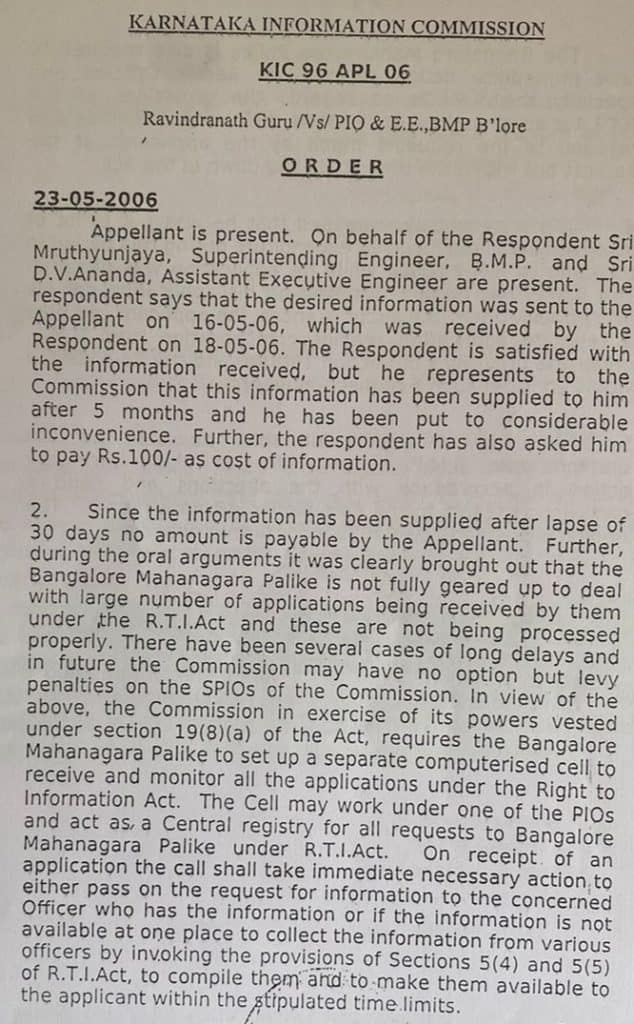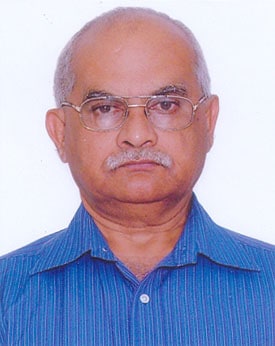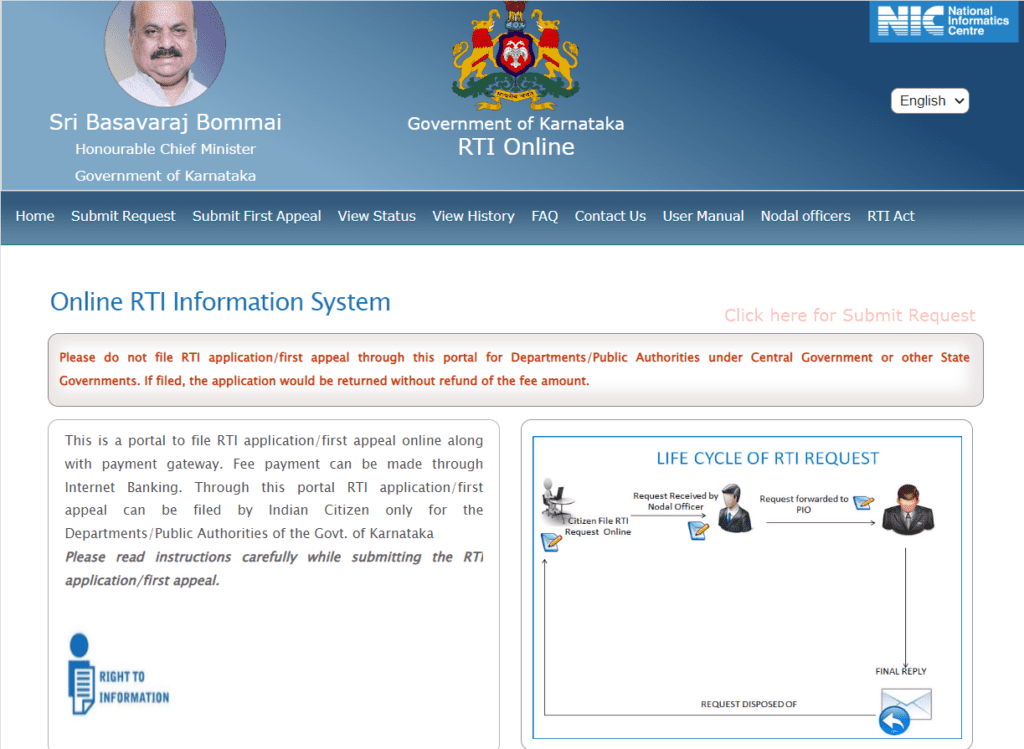Ever since BBMP closed down its RTI (Right to Information) Cell five years back, it’s been tougher for citizens to get information about BBMP’s decisions and actions. For 11 years (2006 to 2017), the BBMP head office had a fairly active central RTI Cell that accepted all RTI requests. The applicant only had to address the request to the ‘PIO (Public Information Officer), BBMP’, and the PIO in charge of the RTI Cell would forward the request to the concerned officer.
Since the closure of the Cell in 2017, citizens have to identify the specific PIO in charge of the department/area that the RTI inquiry relates to. Not an an easy task given that the BBMP has over 500 PIOs across the city.
“You have to do a lot of physical enquiries yourself,” said Kodur Venkatesh, an RTI activist. “For example, when trying to get information about a particular road, some may say that the local division had built the road, others may say the Major Roads Department at the head office did it, or the PWD or State Highways department did it. So you have to personally meet many officers, and most of them are unfriendly. But you have to identify the right PIO, and then file the RTI with him. Else your application won’t get any response”.
Meeting the right officer is also difficult as officers are frequently out on field work. And others in their department may not be cooperative in giving information or even receiving the application. Applications that require information from multiple offices would be even more difficult to file.
“Even when filed properly, most applications don’t get any response, and then the next step is to identify the right appellate officer,” says Venkatesh. “Nobody would know who this officer is. BBMP’s Central control rooms do help with contact details of the zonal offices, but the zonal control rooms are not helpful. For ordinary people, the process is almost impossible to follow.”
Currently, the BBMP website does have an outdated list of PIOs and appellate authorities which is available only in Kannada, with many of the phone numbers given not working.
RTI activists have tried many avenues to get the RTI Cell to reopen. They even got the state’s Department of Personnel and Administrative Reforms (DPAR) to direct BBMP to reopen the Cell. But BBMP has not responded to the DPAR directive.
Activists had forced formation of RTI Cell
The RTI Cell in the BBMP headquarters was set up following a strong struggle by activists, and not due to any proactive sentiment on the Palike’s part. Even after the RTI Act was passed in 2005, citizens were finding it difficult to get information from authorities on time.
Ravindranath Guru of the RTI activists’ forum KRIA Katte, highlighted this problem in an appeal he filed with the Karnataka Information Commission (KIC) in 2006. He had filed the appeal after being forced to make multiple visits to BBMP offices to follow up on an RTI application. As per the RTI Act, public authorities have a 30-day deadline to respond to applicants, but it took five months in Ravindranath’s case.
Hearing this case, the KIC ordered BBMP to set up a “separate computerised cell to receive and monitor all RTI applications”. The Cell was to act as a central registry for all RTI requests to BBMP and immediately pass on RTI applications to the concerned officer. If the information was unavailable at a single place, the Cell had to collect it from various officers, compile and give it to the applicant within the time limit.
As per the RTI Act, KIC’s decisions are binding on public authorities. Hence BBMP set up its RTI Cell, which functioned till former BBMP Commissioner N Manjunath Prasad pulled the plug in 2017.

Read more: The dos and don’ts for a successful RTI application
Orders to reopen Cell ignored
A circular Manjunath Prasad issued in September 2017 said the Cell was being closed down as RTIs pertaining to various wards were coming to the Cell, and transferring these requests was taking a lot of time. Applicants will instead get information quickly if they file applications directly to the PIO, the circular said. BBMP then published on its website a list of 502 PIOs and 145 appellate authorities.
In the circular, BBMP referred to a case before the KIC in 2016 to justify this decision. At the hearing of this case, BBMP had said that the RTI Cell gets about 200 applications daily and transferring these to the respective PIO took about 15 days. The KIC had then ordered BBMP to take action as per Section 6(1) of the RTI Act, which only says that applicants should submit written applications to the PIO.
The KIC order nowhere mentioned closure of the RTI Cell. The BBMP however interpreted it to mean that applications should be directly submitted to the relevant PIO instead of the RTI Cell. “RTI Cell had limited staff but instead of increasing staff numbers, BBMP shut the Cell,” says Ravindranath Guru.
Read more: How to undermine a powerful Act like the RTI? Learn from Tamil Nadu!
Since the closure of the Cell, Ravindranath has written to various forums – KIC, DPAR, the State’s Chief Secretary – for reopening of the Cell. In his letters he said the Cell was closed only to curtail citizens’ use of RTI. He also pointed out that the maximum pending appeals before the KIC (for not providing requested information) were related to BBMP and BDA, which shows that their PIOs do not intend to give information anyway.
Based on Ravindranath’s letter, the DPAR wrote to the BBMP Commissioner in December 2017, requesting reopening of the RTI Cell. DPAR’s letter said that the KIC had not ordered closure of the RTI Cell, and hence the system should be restored. DPAR sent reminders to the Commissioner in February and May 2018. (Citizen Matters has copies of these letters.)
But to no avail, even though “in addition to the KIC order, government circulars also require BBMP to have an RTI Cell,” says Ravindranath.

For example, guidelines issued by the Centre’s Department of Personnel and Training (DoPT) in 2013, says RTI Cells should be set up in public authorities that have more than one PIO. Applicants may have difficulty approaching the appropriate PIO in such organisations, so the RTI Cell should receive all applications, the guidelines say. DoPT also issued instructions on setting up the Cell, getting financial assistance for this, and on the Cell’s functions.
Ravindranath also points to the State DPAR’s circular of 2013, which says that a government department should establish an RTI Cell if 10% or more of the applications it receives are RTI applications.
Yogesh, who recently took charge as Deputy Commissioner (Administration) at BBMP, says they will bring the issue to the notice of the BBMP Chief Commissioner. “There has been no action since five years,” he says. “We need to check if there has been any correspondence from the government or Information Commission since then. And then we will bring this to the notice of the Chief Commissioner for decision making.”
Meanwhile, RTI activist Venkatesh says BBMP should reopen its RTI Cell to at least guide applicants, if not accept applications directly. “At least they should be able to tell citizens where to find application forms, how to file these, and which PIO they should send it to.”
Like BBMP, the BDA (Bangalore Development Authority) had also shut down its centralisalised RTI system in 2016. BDA has maintained that the centralised system delays response to applications, and has refused to restore it.
Pinning hopes on online RTI
Meanwhile, RTI activist Veeresh B H believes the way forward is to strengthen the online RTI portal under the State’s e-Governance department which accepts applications on behalf of various departments. BBMP was onboarded into the system last September. Nodal officers have been appointed for all eight zones, along with an additional ‘central zone’. These nodal officers are supposed to accept the RTI applications filed online and dispatch it to the appropriate PIO.
“The applicants need not give the exact name of the PIO, they just need to select the correct zone out of the nine zones overall,” says a department source. “The nodal officer for the zone will then forward the application to the right PIO who has to respond in the next 30 days.”
In the nine months since BBMP was onboarded onto the system, it has received around 900 RTI requests (until June 16th), says the source. The highest number of requests are from the Central, Bommanahalli and Mahadevapura zones (around 150 each), whereas the least is from Dasarahalli (10). These numbers are quite low compared to the usual volume of requests that come to BBMP.

“We want to popularise the online portal,” says Veeresh. “We are following up with the e-Governance Department for this. We have also been trying to get public authorities like BBMP and BDA to publish ward-wise information proactively”.
Ms.Navya,
Your efforts are appreciated.
In my opinion, the solution to get the BBMP cell to restart is by the directions of Hon’ble High court of Karnataka. Inspite of it, if BBMP fails to restart, revoking contempt of court and sending the head of the department to jail is the final solution.